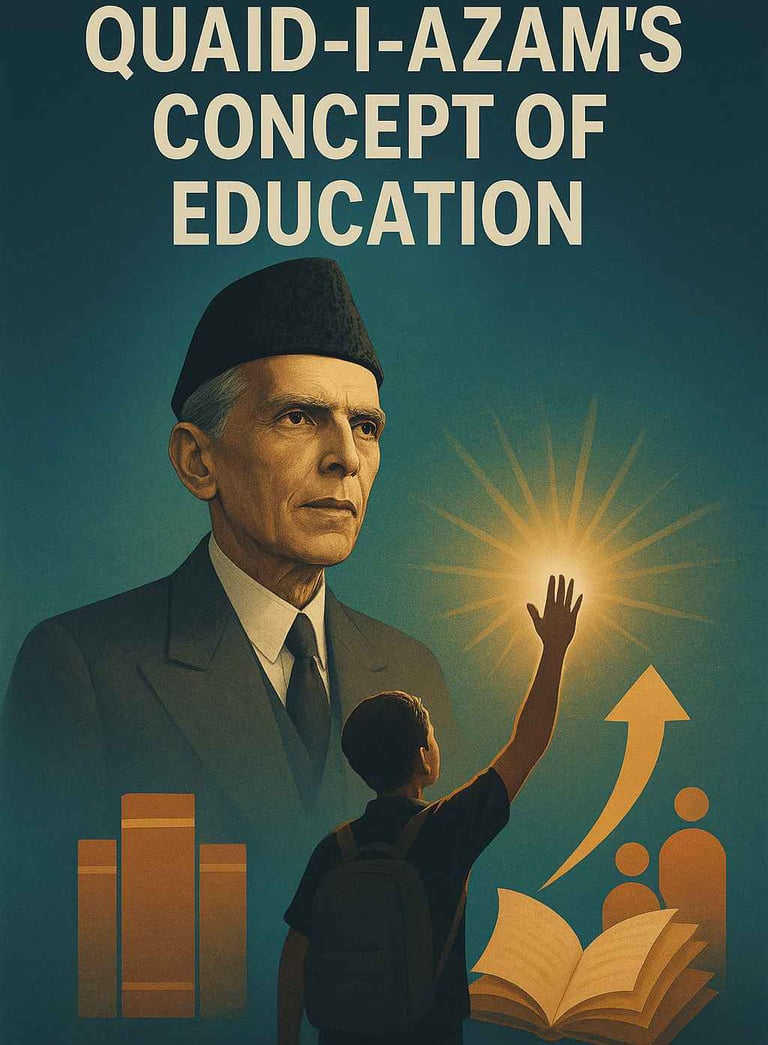DAILY BEST KNOWLEDGE
Quaid-i-Azam’s Concept of Education
This article explores Quaid-i-Azam’s concept of education in Pakistan, highlighting his emphasis on scientific, technical, and vocational training over traditional clerical roles. It covers his belief in women's education and their vital role in national development, as well as his efforts to reform the colonial-era education system to meet the new nation's economic and social needs. The piece also delves into his ideas for building a strong, moral society through education.
HISTORY
Iftikhar Ishaque Memon
7/19/20255 min read


The Quaid recognized that for pupils to handle the weighty obligations of the modern era, technical and scientific education was essential. Speaking on March 24, 1946, at Islamia College's yearly convocation in Lahore, he said:
“Thousands and thousands of young men are returned from colleges and universities who count on a profession in nothing but government service, clerkship, and other routine jobs. I ask you to seek fresh avenues…. ‘Commerce and industry,’ said Mr. Jinnah, ‘are the very foundations of a nation…. Besides, scientific and technical knowledge is very essential in this age. You should now train yourselves in this direction.”
Quaid had faith in young people's ability to achieve great things if given the right circumstances. Regarded as "the arsenal of Muslim India," the Muslim University Aligarh provided an army of students to further the cause of Pakistan. He spoke at significant gatherings called by Muslim University personnel and students while on his frequent trips to Aligarh. In his remarks, he expressed his opinions on the pertinent topics. As a supporter of women's education, he chose the Muslim University platform to voice his opinions in favor of women's involvement in national affairs. He made the following statement on March 10, 1944, during the Muslim University Muslim League meeting: "It is a crime against humanity that our women are shut up within the four walls of the houses as prisoners." I'm not saying that we should emulate the vices of the West. However, let us endeavor to elevate the standing of our women following our own Islamic principles and values. In every aspect of life, you should travel with your women as allies, eschewing the immoralities of Western culture. You cannot expect a lady to raise your children well if she is uninformed herself. It is within a woman's capacity to raise children morally. Let's not discard this valuable asset.”
He expanded on this notion of the prevailing education system and clarified that the British government's goal was to create clerics in order to use the educated Indian class to assist them in ruling India. Lord Macaulay created this system to produce "your most obedient servants." To paraphrase Lord Macaulay, the guiding tenet of this system was, "We want Indians in color but Englishmen in taste and aptitude." When English took over Persian as the official court language in 1835, that was, at least, the first goal.
The Quaid was aware of how difficult it would be to restructure the colonial educational system so that a new one that would meet Pakistan's religious, sociocultural, and economic needs would emerge. The Quaid said, "Education will be one of the problems that the Pakistan government will be called upon to deal with when it is established, to be followed by economic and social reforms," in response to a recommendation that the education of Muslims at all levels required a full revamp.
“Education is the foundation of every nation,” said Mr. Jinnah on 12 January 1947, and added that “it was a matter of regret that Sindh was the most backward province in the whole country in education. He was glad that there was some awakening now and urged for an earnest drive towards literacy throughout the province, extending to all communities.”
The entire school system was utterly inadequate at the time of partition. Textbooks and curricula were antiquated. The state of higher education was equally appalling. There were just three institutions, one of which was the University of Sindh, which had been founded a few months before Pakistan's independence on April 3, 1947, and a few colleges throughout the regions that made up Pakistan. Science and technical courses were hardly ever studied at the university level. There weren't many resources available for vocational, technical, or scientific education.
Primary education was not a priority for the British. Higher education was prioritized, with primary and secondary education being subservient to the demands of a university degree.
After the establishment of Pakistan, efforts were made to encourage the development of primary education. New primary schools were opened. Qualified teachers were appointed. Modern equipment was provided.
Quaid-i-Azam put all of his effort into controlling the newly formed state. The educational system that the foreign government had left behind worried him a great deal. He sought to replace it with a task-oriented Islamic education that might inspire people to create a robust society that could advance and meet the actual requirements of its citizens. It was vital to educate and prepare the next generation with good foundations to build such a society. In his address to the All Pakistan Education Conference on November 27, 1947, he provided the following definition of education:
Academic education alone does not constitute education, and it even seems to be of a very low caliber. Our people need to be mobilized, and we need to develop the moral fiber of the next generation. In order to strengthen our future economic life, we must provide our people with scientific and technical education. We should also make sure that they engage in scientific trade, commerce, and especially well-planned enterprises. Remember, though, that we are up against a world that is accelerating in this direction. I should also stress how important it is to give technical and vocational education more consideration.
Quaid-i-Azam further said:
"To put it briefly, we need to develop the next generation's character, which includes the highest standards of honor, integrity, selflessness in service to the country, and a sense of responsibility. We also need to make sure they are fully qualified or equipped to participate in the various spheres of the economy in a way that will honor Pakistan."
The Quaid said that nation builders, not clerics, are now needed to run the newly formed State of Pakistan. During his convocation speech at Dacca University on March 24, 1948, he noted that the primary goal of the previous educational and governmental systems was to produce well-trained and equipped clerks. Naturally, some of them advanced and reached their proper level, but the goal was to hire clerks with the necessary qualifications. The entire idea was to instill a mindset, a psychology, a state of mind that a typical man would adopt upon earning his B.A. or M.A. and applying for a government position. He believed he had attained his peak, if indeed he did. I am aware of the true outcome of this, as are all of you. Our experience has demonstrated that the average salary for an M.A. is lower than that of a cab driver and that the majority of so-called government employees live in worse conditions than many menial workers who work for wealthy clients. Now that we live in a free Pakistan, I want you to break free from that mindset and rut. The government is unable to accommodate thousands. Impossible, yet the majority of you become discouraged in the struggle to obtain government service. Only a specific number of people may be taken on by the government; the remainder are unsatisfied and unable to focus on anything else, making them vulnerable to exploitation by those with personal grudges. Working by hand and performing labor is not a source of shame. Technical education has enormous potential because we have a great need for technically qualified individuals. You can study finance, trade, commerce, law, and other subjects that offer a plethora of current opportunities. As time passes, you'll notice that new banks, insurance providers, businesses, and industries are already emerging and will continue to expand.
To honor the nation's founder, the democratic government must adopt Quaid's educational philosophy and make it a top priority to expand education across the nation in order for Pakistan to advance and be admitted into the world's developing nations.
For article on modern education, visit https://www.dailybestknowledge.online/how-digital-literacy-can-transform-your-life-and-career
© 2025. All rights reserved.
This platform delivers well-researched articles to empower your personal and professional life.


